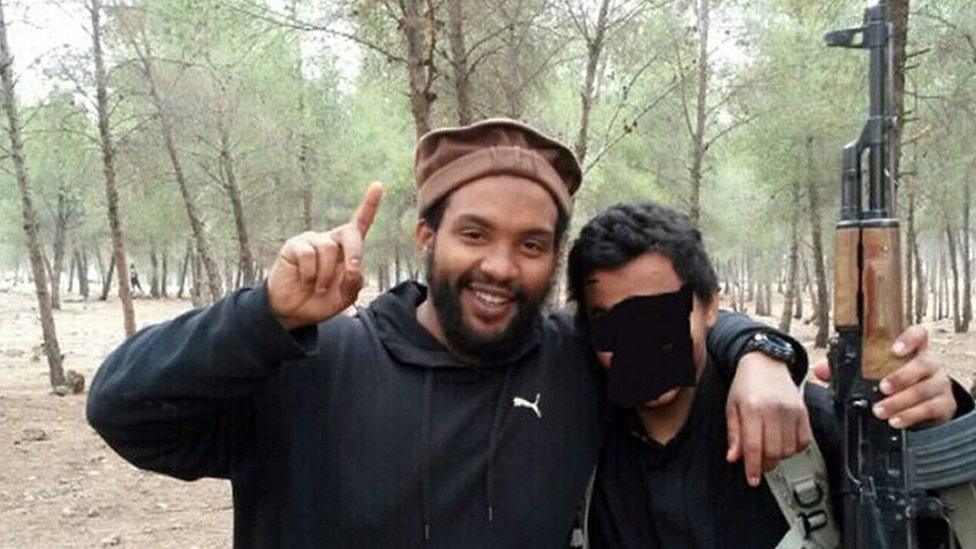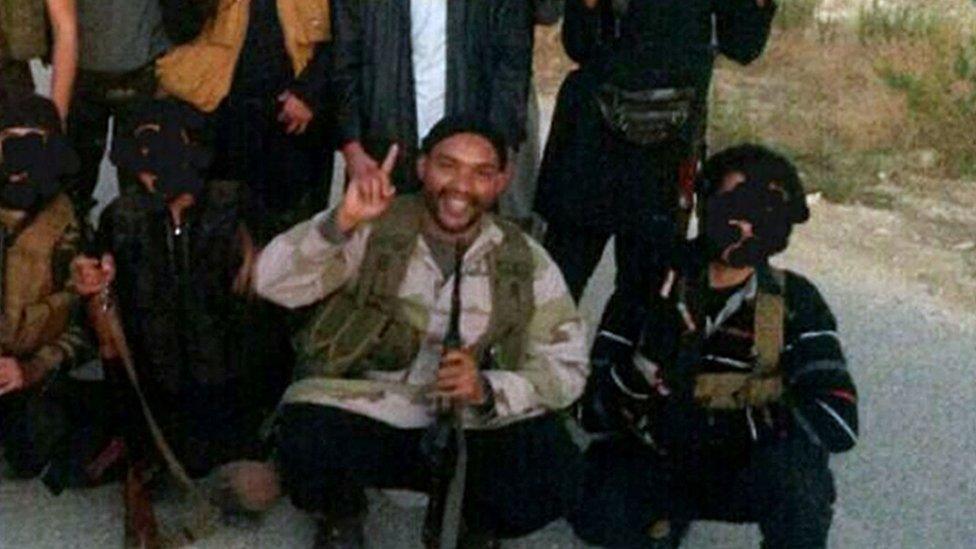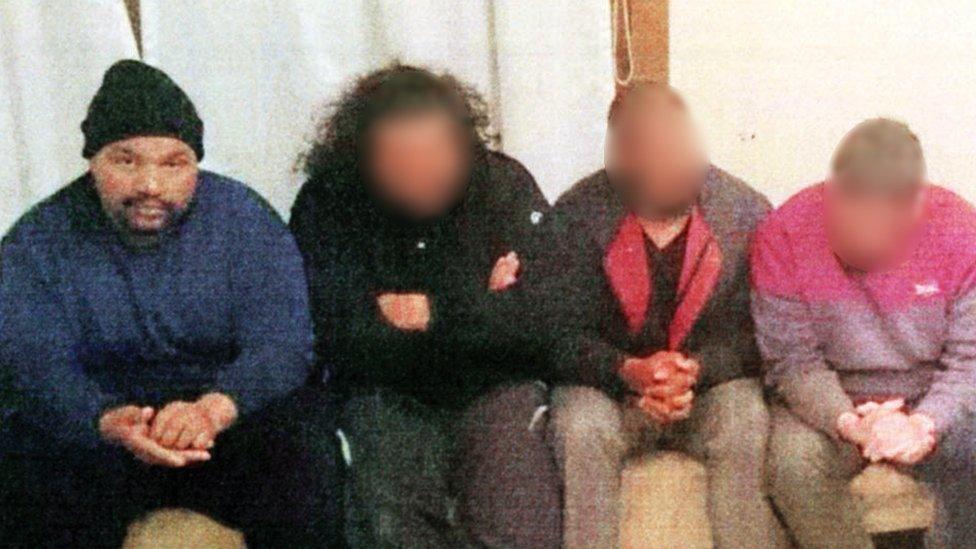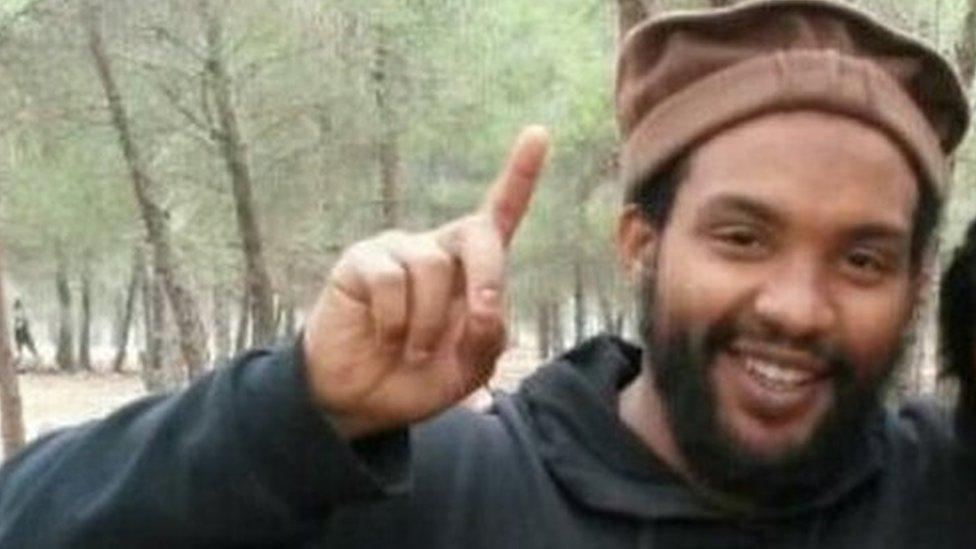Friend of 'IS Beatle' jailed for terrorism offences
- Published

Aine Davis in Syria
A British man who spent two years with Islamic State in Syria and knew the British militant dubbed Jihadi John, has been jailed for carrying a weapon for terrorist purposes.
Aine Davis was also sentenced at the Old Bailey for fundraising after he tried to get his wife to send him 20,000 euros (£17,460).
Intelligence services once believed that Davis was part of the "IS Beatles" who tortured and killed hostages.
Davis was jailed for eight years.
The sentence was made up of five-and-half-years for the firearms charge, and two-and-a-half-years for two fundraising charges - all of which are offences under the Terrorism Act.
Davis was also given two years on licence after his sentence.
He was deported to the UK in August 2022 after serving a prison sentence in Turkey for terrorism offences.

Aine Davis posing with a gun in Syria
Aine Davis was born in west London in 1984. By early adulthood he had a string of drug convictions, and he was jailed in 2004 for possessing a firearm.
He became a Muslim and sometimes called himself Hamza, although he still has the name Aine tattooed on his left arm.
In 2007 he spent time in Saudi Arabia and the UAE. In 2008 and 2009 he visited Yemen, and he travelled to Egypt in 2009 and 2011.
He had become a committed Islamist extremist and attended the same West London mosque as Mohamed Emwazi, who went on to be the executioner in the so-called "Beatles" gang and became known as Jihadi John.
At one point Davis was suspected by the intelligence agencies in the UK and the US of himself being a member of the "Beatles" kidnap and murder gang although that's no longer thought to be the case.
Davis's barrister, Mark Summers KC, told the court the defendant's "early life was difficult and challenging", and religion had been his way out.
He said his client felt it was his "religious obligation" to join the conflict in Syria after seeing images of the war in the country, and "he accepts that was terrorism".
"The reality that he found when he arrived in Idlib was profoundly different from anything he would have ever imagined," said Mr Summers, adding his client had been naïve.
He added Davis wished to apologise to the people of Syria, his own family, and the court.
Passing sentence, Judge Mark Lucraft KC said: "From the messages and images you sent to your wife it is clear you had been with fighters in Syria and that you were not there for lawful purposes."
He added: "It is submitted on your behalf that there is much that has been said about you in the media and elsewhere that is not supported by evidence before the court.
"I make it clear I am sentencing you for the offences on the indictment and for nothing else."
Watch: Judge Mark Lucraft KC passes sentence on Aine Davis
In February 2012 Davis left the UK with Alexanda Kotey, another friend from the mosque, and two other men who later died as foreign fighters in Syria.
They travelled to Turkey where Kotey was denied entry, but Davis was not. For reasons that are not clear, Aine Davis was subsequently banned from Turkey in March 2012.
In August 2012 Alexanda Kotey managed to get to Syria with Mohamed Emwazi.
Kotey is currently serving a life sentence in the United States for the torture and murder of American hostages there.
He admitted being a member of the kidnap gang that became known by their captives as the 'Beatles', a name they were given because of their British accents.
Davis himself returned to Turkey in July 2013, and after crossing the border into Syria spent the next two years with the Islamic State group, but he has always denied being one of the 'Beatles' himself.
In August 2014 Davis's wife Amal El-Wahabi, who he had met at a west London mosque, was found guilty of trying to send him the 20,000 euros (£17,460) for the purposes of terrorism.

Aine Davis at the time of his arrest in Silivri, Turkey
In November 2015 Davis crossed the border from Syria back into Turkey using a false passport. He planned to attend a meeting with other senior jihadists, possibly - according to Turkish court documents - to plot an attack in Turkey.
He was arrested by Turkish police in a villa in a luxury coastal complex in Silivri rented by Kamran Faridi, an FBI asset.
That same day Mohamed Emwazi (Jihadi John), was killed by a drone strike in Syria.
Davis was jailed in Turkey for being a member of a terrorist organisation and after his release was deported to the UK and immediately arrested.
On 10 October this year he pleaded guilty to possessing a weapon for terrorist purposes and two charges of fundraising.
He had fought a lengthy legal battle to get the charges dismissed, arguing at the Old Bailey and the Court of Appeal he had already spent time in prison in Turkey for similar offences.
In a statement following the sentencing, Cdr Dominic Murphy, who leads the Met Police's Counter Terrorism Command, said he hoped the case would send the message that "we will relentlessly pursue and seek to prosecute anyone involved in terrorism both in the UK and abroad, no matter how much time has passed".
Was there a fourth 'IS Beatle'?
As recently as October 2020 US prosecutors in a press release, external had still been talking about four Islamic State Beatles, and although he was not named, Davis was the suspected fourth man.
However, the American government never sought to extradite him, despite then Home Secretary Priti Patel in July 2022 having discussed with the US deputy attorney general whether Davis could be put on trial in the United States.
Documents that emerged during his appeal suggest prosecutors in the Southern District of New York were still hoping to bring a case against Aine Davis as late as July 2022.
Now Mohamed Emwazi is dead, and Alexanda Kotey and a third Briton El Shafee Elsheikh are serving life sentences in the US. But that only makes three "Beatles".
Now it is less clear if there was a fourth Beatle. In public at least, exactly what Davis did in his two years with the Islamic State group remains something of a mystery.
- Published11 August 2022

- Published10 August 2022
